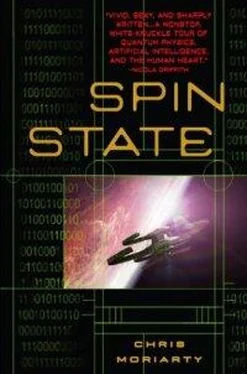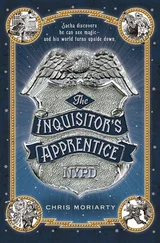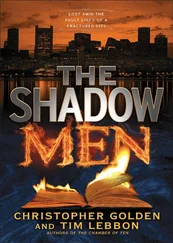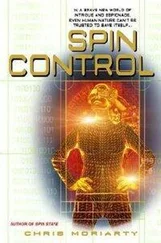There was a tawdriness about the churchyard that didn’t show up in her childhood memories. The rectory’s peeling whitewash, the cheap insulation foam packed around badly fitted windows, the too-bright colors of artificial flowers, the mottled laminate of headstones peeling under a chemical rain they had never been designed to stand up to. It was almost enough to distract her from the really startling thing about the churchyard: how young everyone in it was.
She walked along the rows looking at birth and death dates. Thirty-five. Thirty-four. Twenty-four. Eighteen. And that wasn’t even counting the babies’ graves, half grown over by green-gray clumps of oxygen-producing algae.
She stumbled on the grave she was looking for by accident—and as soon as she saw it she knew that, whatever she’d thought, whatever she’d told herself, she hadn’t been ready to see it. She hadn’t really believed in it, any more than she believed, really, that her father had been dead all these years.
But there it was. Gil Perkins. And the dates, below the name. He’d been thirty-six when he died. Which meant that the old, worn-down, coal-scarred father of her childhood had been younger than she was now.
“Can I help you?” a man’s voice said behind her.
She spun around, chest heaving.
A priest. Young. Athletic-looking. Not local. He looked at her with bright-eyed interest. He had an intelligent, sensitive face, the face of a bright young man who believed that people were basically good. He was probably two or three years out of seminary, getting his first taste of poverty, feeling himself on the front lines here, fighting the good fight. Li knew the type. They did a lot of good, but they were in Compson’s World, not of it. They came for a year, or two, or ten, but eventually they always went back to the Helena spaceport and caught a jumpship home. A decision for which Li was in no position to blame them.
“I—was just taking a walk,” she said. “Just looking.”
“Someone you knew?”
“What? Oh… yes. A little.”
“Fifteen years, and he still gets visitors. He must have been the kind of man people remember.”
“There was nothing special about him,” Li said.
The priest smiled. “If you say so.”
She looked at his thin, clever, honest face. He was no one she remembered. No one who would know her or would even have heard of her. He was younger than her, for Christ’s sake. Why not take a chance?
“So who visits him?” she asked casually.
“A Mrs… Oh, I can’t remember her name. She moved to another parish before I got here. Blond.” He grinned. “Irish as green grass and tinkers’ ponies. Tall. About my height.” Then he held up his right hand, and Li knew what he was going to say before he spoke. “Missing part of a finger.”
“Left it in Londonderry,” Li murmured. The words came out in an accent she’d spent the last decade weeding out of her speech. She felt as if someone else had spoken them. Someone whose face she should remember.
“Really? She was a Provo? No shit.” The priest shook his head. “Stubborn buggers. You’d think the UN would just give up and let them stay there.”
“You’d think.”
Li looked back at the headstone. It had started to drizzle, and the rain speckled the laminate face of the marker, spreading across the pale surface like ink stains. She shivered and pulled her collar closer in against her neck.
“I could give her your name,” the priest said. “If you want to talk to her.”
Li caught her breath. “No. No, I don’t think so.” She swallowed, her heart hammering. “I doubt she’d even remember me. And what’s the point of stirring up old memories? People have to get on with life sometime.”
* * *
McCuen met her at the shuttle gate looking white and stricken.
“Christ,” she said when she saw his face. “What’s happened?”
“It’s Gould. She’s gone.”
“When?”
“Two, three hours ago.”
Li stepped past McCuen and started walking toward HQ. “Three hours isn’t the end of the world, McCuen. She can’t have gotten far.”
“It might be longer…”
She turned on him. “How much longer?” she asked, speaking slowly and very clearly.
“I’m sorry,” McCuen said miserably. “I—she went to bed last night, then in the morning, even though she didn’t go to work, she was using power, water, air. She was onstream. We monitored the calls. No one saw guests go in, and it never occurred to me until I saw them that she wasn’t making those calls. But she wasn’t. They just used her home system to make us think she was.”
Like Li had used Sharifi’s system to fool her way into Gould’s office. Was it a coincidence? A joke? And if not, then what the hell was Gould up to?
“Why didn’t you call me right away when she went missing, McCuen?”
“I did. I tried. You—you were off-grid.”
Of course. She’d gone to old Shantytown. She’d been walking down memory lane, leaving an inexperienced kid in charge while the investigation fell apart. And they were already paying for it.
“Maybe you should go onstream and see if you can find her?” McCuen said. “I—I’m so slow. Maybe you can turn something up. That’s why I came out to meet you.”
“Yes,” Li said. “But not here. In private.”
When they reached HQ the duty officer was waiting for her, wanting to tell her something. She swept past, ignoring him, and waved McCuen into her office.
“All right,” she told him, sitting down on the desk she still hoped she wouldn’t be here long enough to think of as anything but Voyt’s desk. “What kind of time frame are we looking at? When’s the last time someone actually saw her?”
“Last night, Ring-time. Twelve hours.”
“Jesus,” Li said, then saw the stricken look on McCuen’s face and bit the rest of her words back. It was an understandable mistake, even if it was potentially disastrous. They might as well skip the recriminations and just fix it. If they still could.
She closed her eyes briefly as she slipped on-line, then opened them to a disorienting double vision of streamspace superimposed on McCuen’s pale features. “You’ve checked credit access and so forth?” she asked.
“Yes. Nothing.”
She checked again, ticking over bank reports, food and water and air charges, spinstream access debits, looking for the tracks no person in the Ring could help laying down every minute of every day of their conscious lives. “It doesn’t make sense,” she said. “There can’t be nothing. Not unless she’s dead.”
“Dead or using cash.”
“You can’t use cash Ring-side, McCuen. No one takes it. Even the scatter dealers and chop artists want nice clean freshly laundered credit.”
“Maybe she’s not Ring-side,” McCuen said, looking as if he desperately wanted to be wrong.
“You can’t get off the Ring without credit,” Li snapped. Then she caught her breath as gut instinct made a connection that she knew at once had to be right, though she didn’t know how or why.
“Check the shipping records,” she told McCuen. “Get me the name of every ship that’s left on the Freetown run in the last twelve hours.”
Two hours later Li was bending over McCuen’s monitor watching wavering security-cam footage of passengers filing along the boarding gantry of a Freetown-bound cargo freighter.
“Are you sure?” McCuen said when she stopped the tape and pointed.
“I’m sure.”
The silk blouse and expensive handmade jewelry were gone. Gould wore cheap clothes, cheap shoes, carried what little baggage she had in a cheap viruhide shoulder bag. She had chopped off her fair hair or shoved it under a hat, Li couldn’t tell which. And she was keeping her head down, moving fast, not letting the cameras get a clear view of her. But there was the straight, thin line of her mouth, the arrogant curve of cheekbone and nostril, the air of unbending, unquestioned superiority that made Li perversely glad this woman was running from her.
Читать дальше












